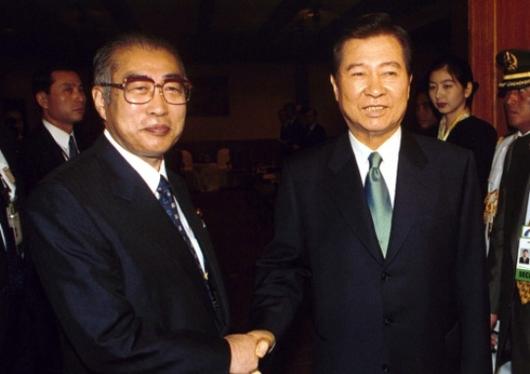 |
On August 10, the tenth anniversary of the death of former President Kim Dae-jung (DJ), the top five government leaders (heads of the National Assembly, the Supreme Court, the Constitutional Court, the prime minister, and the chief of the National Election Commission), including Moon Hee-sang, chairman of the National Assembly and the leaders of the five political parties remembered the former president at the Seoul National Cemetery. In his memorial address, Chairman Moon said, "Former President Kim presented a solution and future vision in bilateral relations with the Kim Dae-jung-Obuchi Declaration in 1988." He further said, "Our people will proactively and proudly overcome this difficulty." Ruling and opposition politicians including Hwang Kyo-ahn, leader of the Liberty Korea Party, in one voice, also remembered the former president's insights and courage, which had helped advance relations between South Korea and Japan. We agree with these evaluations of the politicians and hope the political pledges will to lead to action.
The Kim Dae-jung-Obuchi Declaration was promoted when relations between the two nations was at its worst. After former President Kim Young-sam's remarks, "We will teach Japan a lesson," relations between the two countries crashed leading to the unilateral termination of the fisheries agreement by the Japanese government a month before the president left Cheong Wa Dae. In this situation, President Kim Dae-jung emphasized the need for bilateral cooperation to overcome the Asian financial crisis and to respond to the North Korean nuclear and missile issues as soon as he was inaugurated. The two countries responded and worked to create a friendly atmosphere. Prime Minister Obuchi reaffirmed the Murayama Statement, which mentioned, "a bitter reflection and apology for the past" stating it in an official diplomatic document for the first time, and President Kim responded by suggesting, "Let us work to develop a future-oriented relationship." At last, on October 8, 1998, former President Kim addressed the Japanese parliament and said, "Japan needs true courage to face the past and fear history, and South Korea needs to properly assess the transformation of Japan and find hope in future possibilities." At the time, he even opened the nation to Japanese popular culture against opposition claiming that Japanese culture would prevail. This prompted active cultural exchanges between the two countries, which eventually led to the present day Korean wave or hallyu. The two governments should seriously retrace this process.
Japan is primarily responsible for the current bad blood between South Korea and Japan, for not facing its past. It is unreasonable to argue that the South Korean government did not prevent a ruling made by the Supreme Court in accordance with the separation of powers. The relationship between South Korea and Japan can only start anew when it is grounded on a genuine apology. Nevertheless, we find ourselves disappointed at the response of the Korean government, which failed to lead Japan toward a future-oriented direction. The problems between the two nations cannot be solved by efforts of any one side only. This coming August 24, the nations are faced with the tricky problem of deciding whether to extend the bilateral military information agreement (GSOMIA). More than ever before, weare in desperate need of a firm philosophy, insight and courage in relation to the relationship between South Korea and Japan, such as those of former President Kim Dae-jung.
▶ 최신 뉴스 ▶ 두고 두고 읽는 뉴스 ▶ 인기 무료만화
©경향신문(www.khan.co.kr), 무단전재 및 재배포 금지
이 기사의 카테고리는 언론사의 분류를 따릅니다.
기사가 속한 카테고리는 언론사가 분류합니다.
언론사는 한 기사를 두 개 이상의 카테고리로 분류할 수 있습니다.
언론사는 한 기사를 두 개 이상의 카테고리로 분류할 수 있습니다.


